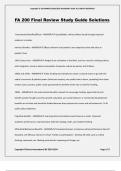Exam (elaborations)
FA 200 Final Review Study Guide Solutions
FA 200 Final Review Study Guide Solutions
Instrumental Benefits/Effects - ANSWER-Quantifiable, indirect effects found through empirical
evidence in studies.
Intrinsic Benefits - ANSWER-Effects inherent in/essential to arts experience that add value to
people's lives.
19th Century Arts - ANSWER...
[Show more]
Preview 3 out of 17 pages
Uploaded on
November 11, 2024
Number of pages
17
Written in
2024/2025
Type
Exam (elaborations)
Contains
Questions & answers
Institution
Prep Tests
Course
Prep Tests
$12.49
100% satisfaction guarantee
Immediately available after payment
Both online and in PDF
No strings attached
Copyright © OLIVIAWEST2024/2025 ACADEMIC YEAR. ALL RIGHTS RESERVED




